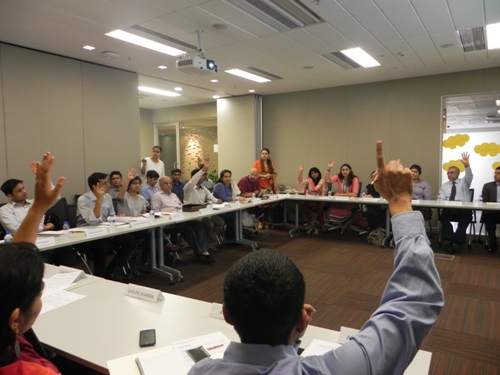 With a stated motto of Inform-Engage-Reform, the RTE Platform is an initiative to bring together all the knowledge on India's landmark Right of Children to Free and Compulsory Education Act 2009. At the RTE Platform, we are aspiring to establish it as a credible, informative and evolving resource on education in India, with a particular emphasis on primary education and the RTE Act.
With a stated motto of Inform-Engage-Reform, the RTE Platform is an initiative to bring together all the knowledge on India's landmark Right of Children to Free and Compulsory Education Act 2009. At the RTE Platform, we are aspiring to establish it as a credible, informative and evolving resource on education in India, with a particular emphasis on primary education and the RTE Act.
The primary objectives of the portal are to:
- Inform: acts as an all-inclusive port of call on RTE-related information and updates from across the country, provides a birds-eye views on the status of implementation of RTE Act in different states including the 25% quota and enables individuals to browse all Supreme Court and High Court judgements on RTE;
- Engage: provides a space for stakeholders to interact, discuss, create, share experiences, and dispel myths regarding the historic Right to Education (RTE) Act. The portal also allows anxious parents to ask questions and get their queries redressed by in-house RTE experts.
- Reform: provides access to reports and case studies on RTE related interventions across the country to encourage the sharing of best practices and increase accountability and improve governance.
Visit the platform at www.RighttoEducation.in
RTE 2.0
With the objective of shifting regulatory focus towards some of the above issues, Centre for Civil Society brought together some of India’s eminent educationists and thought leaders to identify specific amendments to the RTE Act, which would ensure quality education for all in India. Key concerns regarding the structure and impact of the RTE were discussed, and based on this, recommendations for amendments to the RTE Act 2009 have been drafted. RTE 2.0: Building Consensus on Amendments truly aimed at weeding out the pain areas in the existing scheme of things, finding out what works and what doesn’t, and introducing actual amendments to the text of the Act.
Right to Education Tracker
The Right of Children to Free and Compulsory Education Act 2009 (or Right to Education, in short) was passed in both the Houses of Parliament in August 2009. The Right to Education Bill has been debated, discussed and deliberated by various Government commissioned bodies since 2002 (National Advisory Council, National Knowledge Commission, Central Advisory Board for Education), Standing Committee for Human Resource Development and civil society organisations (including Azim Premji Foundation, Confederation of Indian Industry and Centre for Civil Society). We track the evolution of discourse around the Act, broadly divided in to three thematic areas:

